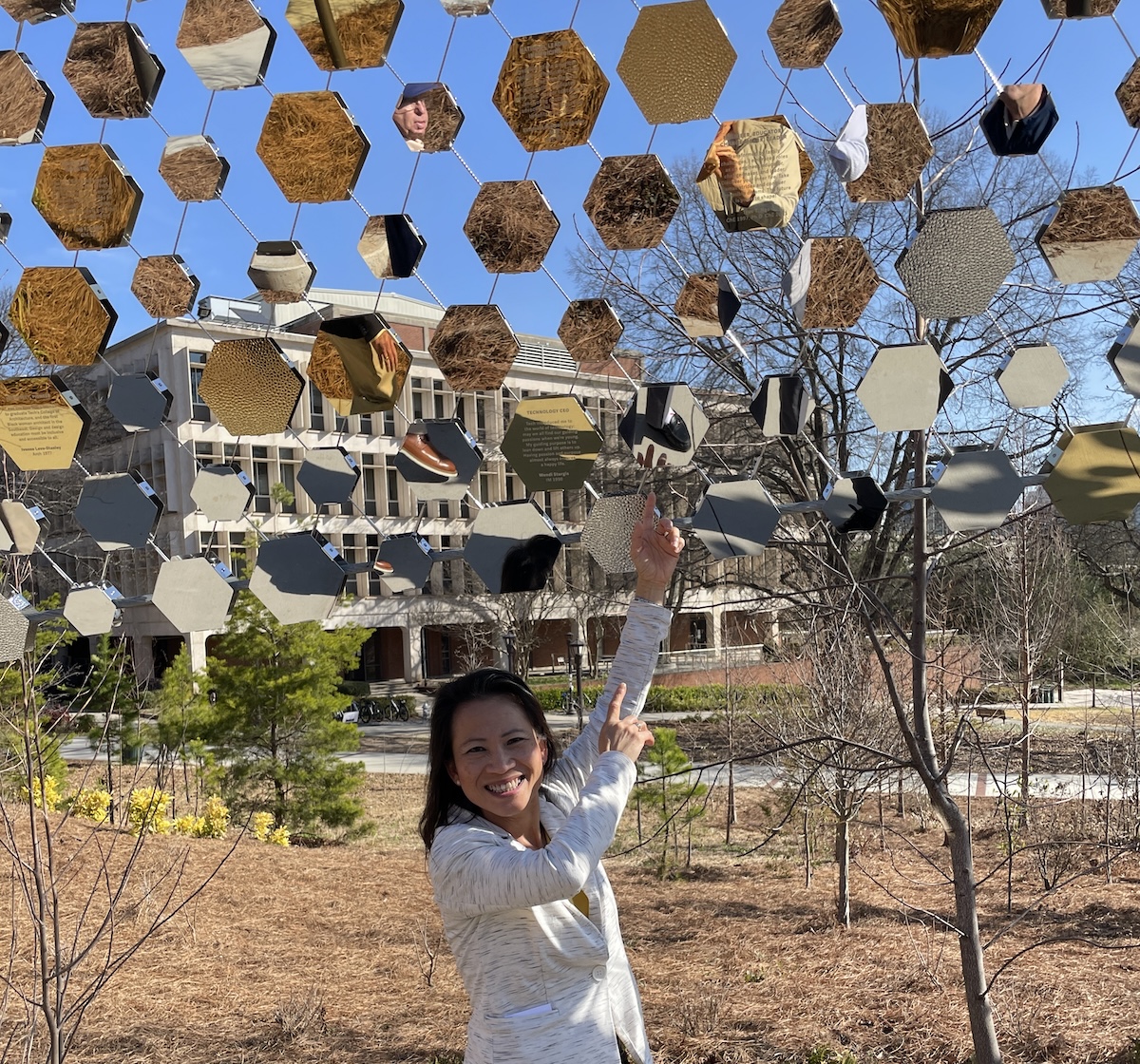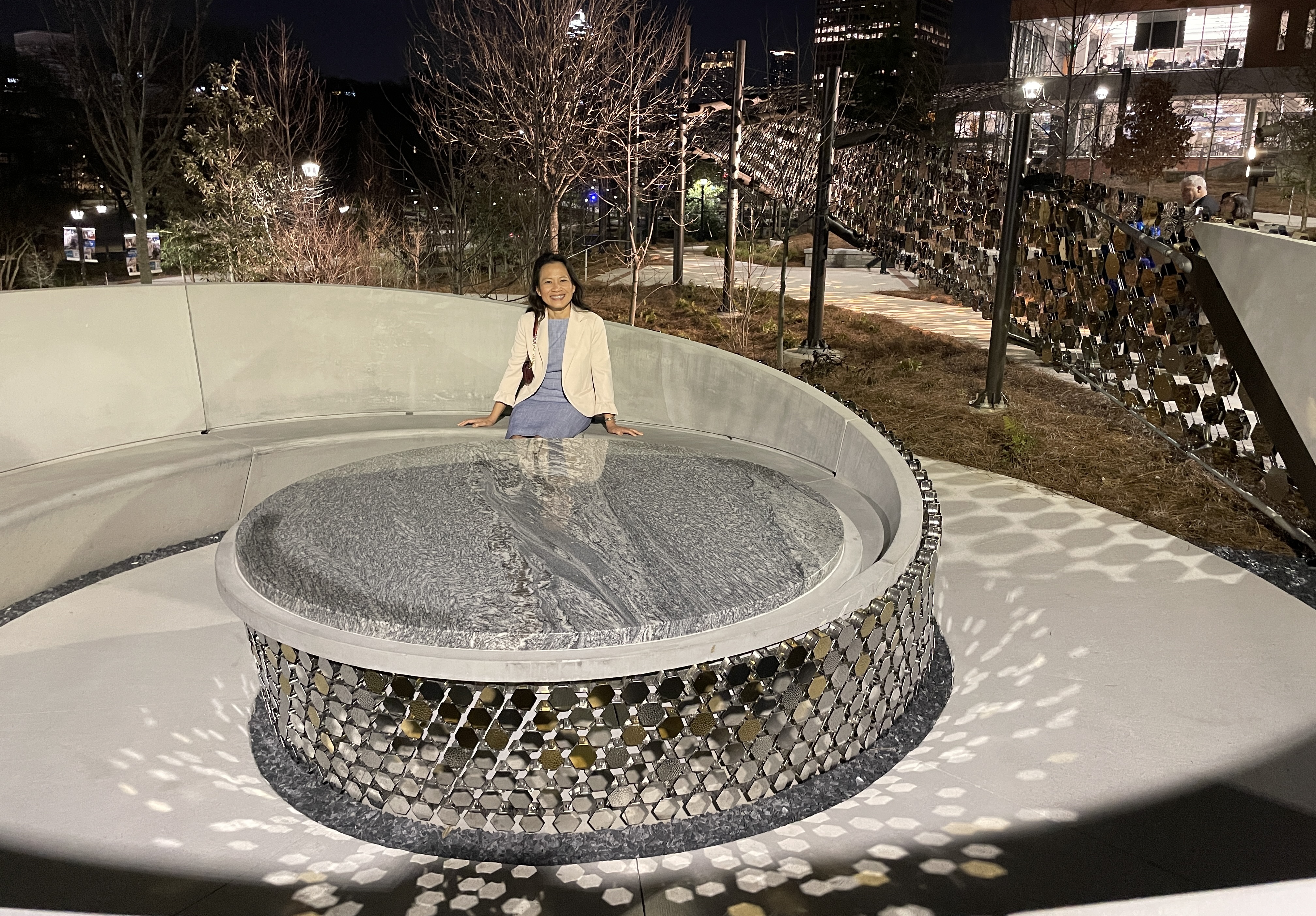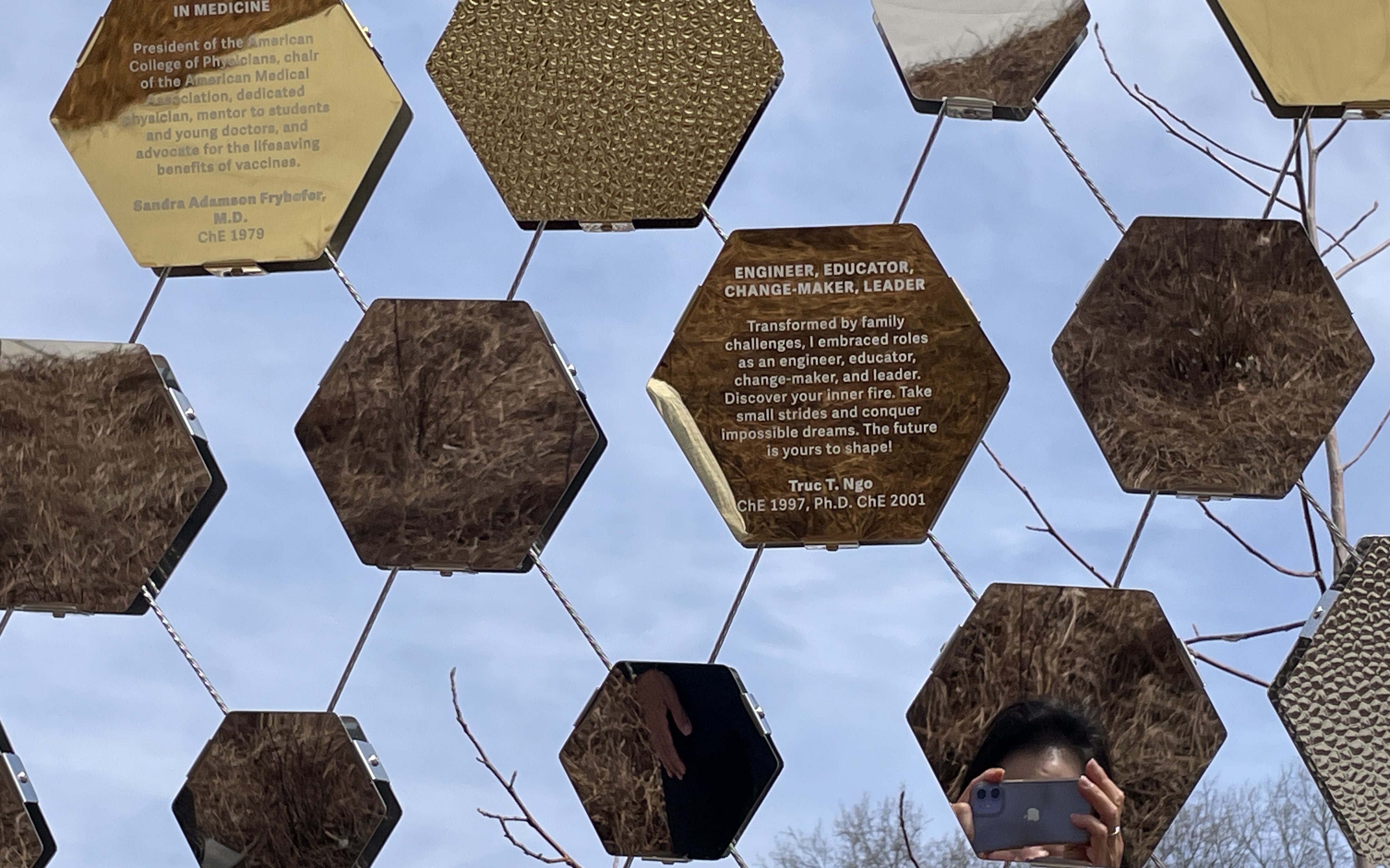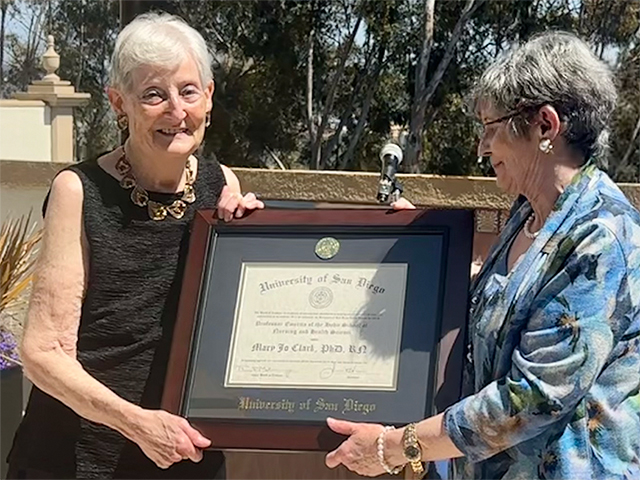Truc Ngo, PhD: Engineer. Educator. Changemaker. Leader.

“As you go through life, you may encounter people who don’t see your worth and say things to discourage you. Don’t let those people or those words become a part of your life. Focus on your passions, learn from others, work towards that goal one step at a time, and don’t forget to live your life authentically to the fullest.” — Truc T. Ngo
Vice Provost for Research and Administration at the University of San Diego, Truc Ngo, PhD, was honored among the inaugural 70 alumnae of the Georgia Institute of Technology (Georgia Tech) during the opening ceremony of the Pathway of Progress on March 8, 2025. The celebration took place on the Georgia Tech campus in Atlanta, Georgia, where the art structure was unveiled and opened to the public.
Each honoree is represented by a mirrored stainless steel hexagon engraved with their name, degree and an inspirational quote. These hexagons are woven into a permanent art installation containing nearly 3,000 tiles that collectively depict the inspirational stories of Georgia Tech women’s achievements — past, present and future.
As we celebrate Women’s History Month, we asked Dr. Ngo to share her story of how she became named among the chosen few alumnae to be honored by Georgia Institute of Technology.

Q: What inspired you to pursue a career in engineering and how did you envision your contributions evolving over time?
A: Two of my uncles are engineers. When I was a teenager, I never asked them what it was like to be an engineer. What I remember was they were well-respected and viewed as “smart people” in the family. I also remembered a family friend in Augusta, Georgia — the second city we lived in after immigrating to the United States in 1991 — who was also an engineer and drove a shiny BMW. I thought to myself: I am smart and capable, and I want to drive a fancy car one day. So, I decided to embark on the pursuit of becoming an engineer.
I chose chemical engineering as my field of study simply because I loved chemistry and was obsessed with math. I did not really understand what a chemical engineer does until my senior year of undergraduate studies, and I loved it. I loved it enough to continue with a PhD in chemical engineering. I longed for that real-world industry experience working as an engineer solving the world’s problems, and so I got it. Working for several years as a senior process engineer at Intel Corporation, I learned so much about the corporate world, technology development and turning ideas and concepts into real products that serve humanity.
I then took another turn in my career and switched to academia more than twenty years ago. As a college professor, I play a key role in shaping future generations of engineers. As a humanitarian, I contribute to uplifting the lives of the most underserved populations around the world. As an administrator, I help derive and implement effective solutions to the problems affecting our communities and beyond.
Growing up, I never envisioned myself becoming an engineer working at a major tech company, a college professor or an administrative leader at a university. One thing I did know was that I would dedicate my skills and talents to making this world a better place.
Q: How has your journey as a woman in STEM shaped your perspective on the field?
A: Before getting into engineering, I honestly did not think about gender differences or challenges in the field, even though all the engineers I knew were men and most of my college buddies were male. All I focused on was to learn as much as I could to become a good engineer while still learning the American culture adjusting to a new life. When I entered the industry with an engineer title, I recognized that there were more men than women engineers across all levels. There were one or two top women leaders, whom I observed and admired, who were super smart, tough and firm in their decisions and directives. It reassured my confidence in possibilities and motivated me to continue to shoot for the stars.
My journey as a woman in STEM has profoundly shaped my perspective on the field. Although I have encountered many people who did not believe in me or found ways to discourage or deter me from advancing, I have also met quite a few who kept faith in me, supported me wholeheartedly and pushed me further than I thought I could go. These champions have helped me discover my strengths and weaknesses, navigate challenges of biases and discrimination and lead with authenticity and integrity. Navigating a traditionally male-dominated environment has fueled my passion for mentoring and supporting others in STEM. I've learned that collaboration and diverse viewpoints lead to more innovative solutions. This journey has also highlighted the importance of representation; seeing women succeed in STEM roles inspires the next generation to pursue their passions without hesitation.
I believe that STEM fields have tremendous potential for anyone who has the passion to use science, technology, engineering and math to solve problems and impact people’s lives positively. Overall, my experiences have reinforced my belief that a supportive STEM community benefits everyone.
Q: What do you consider your most significant achievements and how have they impacted the field of engineering?
A: My first significant achievement was obtaining a PhD in Chemical Engineering. Our family immigrated to the U.S. in 1991 as political refugees. Being the youngest in a large family, I did not have the pressure to support our family financially while starting a new life. I was the first in the family to earn a college degree in the U.S. and the only one to earn a PhD. The hardships my family endured inspired me to seek brighter opportunities, and I felt my educational pursuit was for my whole family, especially for my late brother whose life was cut short by a hate crime before he could pursue his college dream in America.
Another achievement was the cumulative experience and accomplishments during my years working as an engineer at Intel. I was part of the R&D team that developed the processes to build microchips using the first 12-inch silicon technology for Intel, enabling lower costs and technological advancements in computing.
During my tenure at USD, I had the opportunity to partner with a rural community in the Dominican Republic (DR), developing and implementing engineering solutions to improve basic living conditions for the people in the region. For nine years, I worked with students and colleagues to research, develop and test ideas and prototypes to address the problems faced by rural villagers in the DR. Working alongside the villagers to create solutions has transformed myself, my students, colleagues and the local community. We have learned that engineering changes the lives of not only the receivers but also the givers, through collaboration, passion, dedication and love.
Q: What does it mean to you both personally and professionally to be recognized by your alma mater as an honoree included in the inspirational Pathway of Progress?
A: Being recognized by my alma mater as an honoree included in the inspirational Pathway of Progress is incredibly meaningful to me both personally and professionally. Personally, it is a profound honor to be acknowledged by the institution that played a pivotal role in shaping my career and personal growth. It brings a sense of pride and fulfillment to see my hard work and dedication recognized in such a significant way alongside other amazing women pioneers. This recognition also serves as a reminder of the long and hard journey I have taken, and the support and encouragement I received from my family, mentors and peers throughout my journey.
Professionally, this honor reinforces my commitment to excellence and innovation in the roles that I have had the privilege to hold. It motivates me to continue striving for impactful contributions and to serve as a role model for aspiring engineers and leaders. Being part of the Pathway of Progress is not just a personal accolade; it is a testament to the collective achievements of all the women who have paved the way in STEM. It inspires me to keep pushing boundaries and to support the next generation of engineers in their pursuits.
Overall, this recognition is a celebration of my journey and a reaffirmation of my dedication to making a positive impact in the world through engineering.
Q: How do you envision your role in mentoring and inspiring the next generation of women engineers?
A: When I was little, I dreamt of becoming an astronaut. Although I am nowhere near that astronaut dream at this time, I have discovered many possibilities along my career journey. Over the years, I have mentored many students, and some of these students have taught me the true values of compassion. We inspired each other to persevere, to pay it forward and to appreciate life even during difficult times.
I envision my role in mentoring and inspiring the next generation of women engineers as a guide and supporter. I aim to provide them with the tools and confidence they need to navigate their unique paths in STEM. By sharing my experiences and the lessons I've learned, I hope to show them that their dreams are achievable, even if the path is not always straightforward. I want to be a source of encouragement and a reminder that they are capable of overcoming any obstacles they may face.




